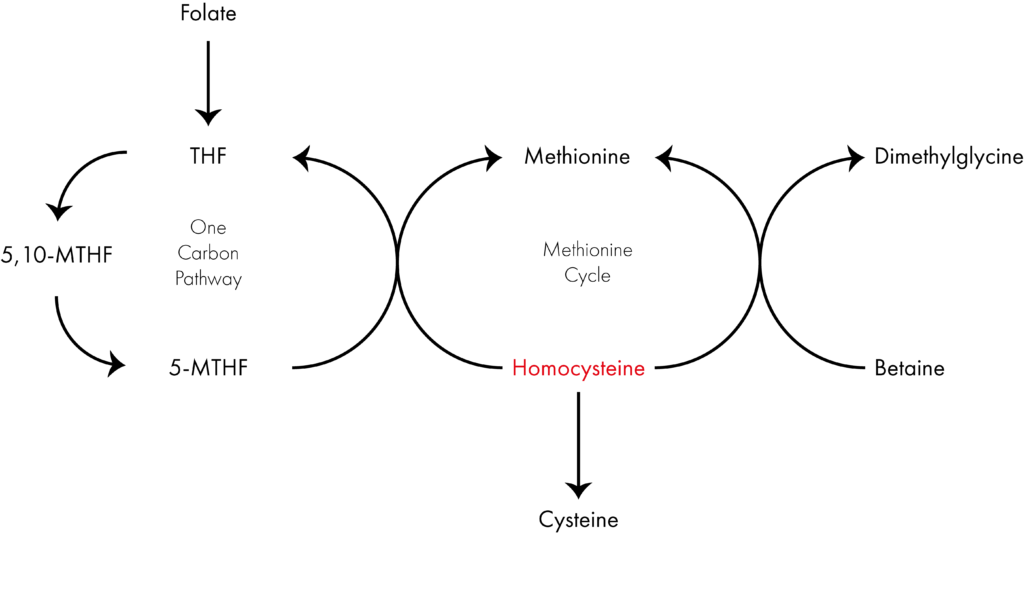The MTHFR Gene and DNA Methylation: A Technical Breakdown
Article at a Glance
The MTHFR gene provides instructions for producing an enzyme called methylenetetrahydrofolate reductase, which is essential for the utilization of folate. This enzyme plays a crucial role in the process of converting homocysteine to methionine, a necessary step for DNA methylation.
Genes Mentioned

Contents
The MTHFR gene is one of the best-known genes involved in DNA methylation.
MTHFR codes for the enzyme methylenetetrahydrofolate reductase (MTHFR, confusingly), which is essential for the maintenance of the folate cycle and DNA methylation.
S-adenysyl methyltransferase (SAM) is a strong inhibitor of MTHFR, which also makes it the major regulator of folate-dependent homocysteine remethylation.
Reader beware, this is a complex topic, but nonetheless, let’s dig into this a bit more, with a look at how MTHFR relates to DNA methylation and the one-carbon pathway.

Get Started With Personalized Nutrition
Gene Food uses a proprietary algorithm to divide people into one of twenty diet types based on genetics. We score for cholesterol and sterol hyperabsorption, MTHFR status, histamine clearance, carbohydrate tolerance, and more. Where do you fit?
What is MTHFR?
MTHFR is an enzyme encoded by the MTHFR gene. It converts 5,10-methylenetetrahydrofolate (MeTHF) to 5-methyltetrahydrofolate (MTHF) as part of the one-carbon pathway. Proper activity of the MTHFR enzyme is essential for good health.
Why? Because this enzyme metabolizes dietary folate and folic acid into the active form of folate required for the synthesis of DNA, RNA and other amino acids. And we need these bioactive nutrients to support cell maintenance and the production of new, healthy cells.
The one-carbon pathway also involves the methionine cycle, which itself functions to convert homocysteine into methionine. MTHF, as produced by the enzyme MTHFR, as mentioned above, is then used by the enzyme methionine synthase as a methyl donor to convert homocysteine into methionine. When MTHF loses its methyl group, tetrahydrofolate (THF) is formed. THF re-enters the one-carbon cycle and may then acquire another methyl group as the process continues.
These pathways are collectively referred to as the methylation cycle, the major activity of which is the transfer of methyl groups between molecules. We’ve already covered elsewhere why DNA methylation matters, so let’s look at what happens when MTHFR activity is sub-optimal and what can cause reduced MTHFR levels and activity.

Factors affecting MTHFR & Methylation
There are three common SNPs associated with altered MTHFR activity, rs1801133 or C667T (as mentioned a moment ago), rs1801131 or A1289C, and rs2066470 or C117T. These are the ones to look for in your genome analysis.
- Polymorphisms in the MTHFR gene, an excess of methionine and SAM, or a low concentration of co-factor vitamin B2 can decrease MTHFR activity.
- This can decrease the synthesis of 5-methyltetrahydrofolate and thus the remethylation of homocysteine. Conversely, when SAM concentrations are low and MTHFR co-factor levels are high, homocysteine remethylation may be increased.
- Clearly, a reduction in MTHFR activity can alter DNA methylation, with research suggesting that individuals who are homozygous for the polymorphism (C677T) in the MTHFR gene have significantly lower levels of methylated DNA when their folate levels are also low.
- Indeed, variations in levels of folic acid and vitamin B2, and MTHFR C677T polymorphism have been seen to affect genome instability. 1
- High levels of vitamin B2 potentially increase the activity of MTHFR, which may lead folate to provide a greater amount of methyl groups for the methionine synthesis enzyme. It has even been suggested that low vitamin B2 concentration in the presence of low folate may maximize the risk of genome hypomethylation. 2

Get Started With Personalized Nutrition
Gene Food uses a proprietary algorithm to divide people into one of twenty diet types based on genetics. We score for cholesterol and sterol hyperabsorption, MTHFR status, histamine clearance, carbohydrate tolerance, and more. Where do you fit?
Why does MTHFR matter?
Reduced MTHFR levels and activity means that the one-carbon pathway stalls. This has a two-pronged effect.
- First, molecules normally processed by the MTHFR enzyme (such as MeTHF and folate) can accumulate to undesirable levels.
- Second, lower levels of MTHF production mean that the methionine cycle slows down, which can lead to the accumulation of homocysteine.
As many of you will already know, elevated homocysteine has been linked to a variety of health issues including heart disease, stroke, hypertension, cancers, and even birth defects. Indeed, some research suggests polymorphisms in MTHFR may increase the risk of homocysteine-associated diseases like diabetic kidney disease. 3
What you can do to support MTHFR function
So, what can you do if you see an MTHFR issue in your genetic profile?
Well, rather than supplementing with folic acid, which would likely accumulate due to a lack of MTHFR to process it, consider an active folate supplement instead that contains methylfolate.
This means 5-MTHF, which does not require conversion by the MTHFR enzyme. Supplementation (with very conservative doses) may be beneficial for those carrying the risk ‘T’ allele of C667T or the risk ‘C’ allele of A1298C.
Further, remember that vitamin B2 is an MTHFR co-factor, so getting adequate B2 in the diet is also crucial. Below, we have included a video from Dr. Chris Masterjohn, who appeared on the Gene Food podcast several years ago now.
See also: Common methylfolate side effects



